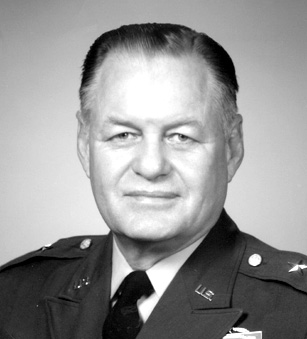Frank Mucedola (1921-2007) served as a Tech Sergeant in I-304-76. A musician in civilian life, he established the Frank Mucedola Accordian School in Auburn, New York and has toured with the world-renowned Mantovani Orchestra.
The following article originally ran in
The Auburn Citizen August 24, 2003
The 76th Infantry Division received its “Baptism of Fire” during the battle of the Bulge.
After crossing into Germany from Belgium and Luxembourg, the division was the spearhead of General George S. Patton’s 3rd Army final drive across central Germany and were among the first troops to make contact with the Soviet Red Army in the vicinity of Chemnitz, Germany, in May 1945.
The 76th Division had gone further east into Germany than any other American unit.
When Germany was divided into East and West, the 76th Division found itself in the East and was subsequently pulled back into the Western Zone.
However, between May and August 1945, when the Russians arrived, the 76th Division was on occupation duty in Schmolln, Thuringen, Germany.
From August 1945 until the Berlin wall fell, schools in occupied East Germany were required to teach students that Germany had been liberated from the Nazis by “The Glorious Red Army.”
The pre-1945 generation knew better, but kept silent out of fear of reprisals.
When the 76th Division was relieved of its occupation duties in August 1945, it was deactivated and its troops were reassigned to other units slated for the invasion of Japan which, for a brief time, was still at war with the United States.
Fortunately, that assignment never materialized as the atomic bomb ended the war and the troops were sent home.
Many years later, after the fall of the Berlin Wall, the people of Schmolln in the former East Germany wanted to correct what they knew was a historical lie. They were not liberated from the Nazis by the Soviet Army, but by the 76th Infantry Division of the United States Army.
On April 13, 2003, the people of Schmolln erected a memorial to the 76th Division to show their appreciation.
I am one of the nine Auburnians who served in the 76th Infantry Division during World War II and am grateful that the people of Schmolln have honored us with their thoughtfulness.
-Frank Mucedola
Auburnians who served in the 76th Division in WWII
George P. Diehl
Paul J. DiFabion
Ronald P. Hart
Robert T. Mott
Frank Mucedola
James Napoli
George T Ryan
James Smith
Paul A. Tripociano
Pictures from a 2003 Veterans Tour that included Schmölln.
Inscription on plaque:
THIS PLAQUE RESPECTFULLY
PRESENTED TO
THE PEOPLE OF SCHMOLLN, THURINGEN, GERMANY
BY
THE 76TH INFANTRY DIVISION
AND
COMPANY I, 304TH INFANTRY REGIMENT
UNITED STATES ARMY
WHO SERVED IN THIS CITY FROM MAY TO JULY 1945
“THANK YOU FOR REMEMBERING US”
76TH INFANTRY DIVISION ASSOCIATION
APRIL 13, 2003
Postscript
In 2010 David Keefe, a US Marine and grandson to Richard Keefe (I-304-76), visited Schmölln to honor his Grandfather’s service in the War and to see the plaque firsthand. Here’s the video he took.










